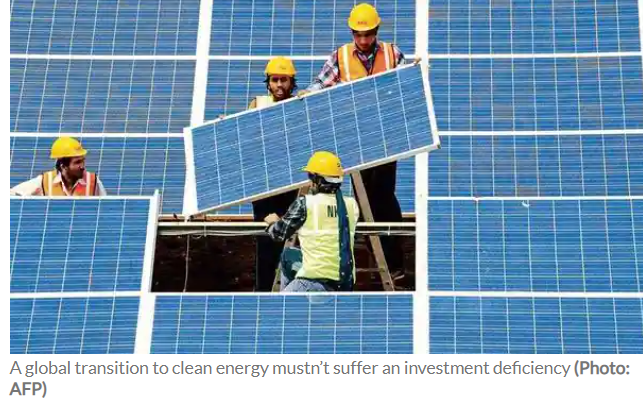Picture Credit: A global transition to clean energy mustn’t suffer an investment deficiency (Photo: AFP)
The economics of renewable energy has improved beyond recognition. Solar power is now the cheapest form of electricity in history. Over 90% of power-generation capacity added around the world last year was in renewables. But to stand a chance of limiting global warming to 1.5° Celsius above pre-industrial levels, the world’s energy systems must transform even faster. And that needs governments and public financial institutions to stop supporting fossil fuels and instead support the clean-energy transition.
The science is clear. To meet the 2015 Paris climate agreement’s 1.5°C target, the global energy transition needs to progress 4-6 times faster than currently. Fossil fuels still supply 84% of the world’s energy and account for over 75% of global emissions. The International Energy Agency’s ‘Net Zero by 2050’ roadmap shows that global energy systems must be fossil-fuel-free by 2040. Yet, since Paris, G20 governments have provided more than three times more public finance for fossil fuels ($77 billion) than for renewables every year.
As future prosperity lies in clean energy investment, there is a clear development case for redoubling our efforts. Wind and solar are now cheaper than new coal and gas power plants in two-thirds of the world. The dramatic cost reduction over the decade has transformed options, particularly in poor countries, where renewables-based mini grids offer opportunities to alleviate energy poverty and provide energy access.
Boosting investment in renewables is also vital to creating jobs, driving economic growth, and reducing air pollution. According to the International Renewable Energy Agency, deploying renewables at scale could help create 42 million jobs worldwide by 2050. This additional employment will be crucial for recovery from the covid pandemic, especially in countries with young fast-growing populations.
But jobs will also vanish as we abandon fossil fuels. To ensure that every community benefits from the transition, we’d require carefully designed policies to support a managed shift. Global solidarity will be critical and so we must do much more to provide everyone with the necessary technologies, expertise, investment support and financial strategies.
Fortunately, we already have solutions to the problem. At the United Nations Climate Change Conference (CoP-26) in Glasgow, governments and financial institutions must commit to supporting cheaper, cleaner, no-regrets energy, and to ending all international support for fossil-fuel-based power. We are already starting to see significant progress. In May, G7 member states committed to cease all of their international financing for coal projects by the end of 2021, and to “phase out new direct government support for carbon-intensive international fossil fuel energy.” Moreover, South Korea, Japan and now China—the world’s largest providers of international coal financing—have also agreed to stop funding coal projects overseas.
Equally important, more than 85 countries (plus the EU) have submitted updated national climate pledges, as outlined in the Paris agreement. These show a clear trend toward higher renewable energy use and lower reliance on fossil fuels by 2030. But many of these countries will need technical and financial support.
The UK and European Investment Bank have both committed to making international support for the clean-energy transition a high priority. In 2019, the EIB became the first multilateral bank to announce an end to all financing for fossil-fuel energy projects (by 2021). The bank has been increasing its investments in clean energy. In Kenya, EIB investments have helped build the largest wind farm in Africa, providing clean and affordable energy.
Similarly, in March, the UK government put an immediate end to new public support for overseas international fossil-fuel energy projects, fully shifting investment into renewables. This decision has already started to unlock opportunities, building on existing support for clean energy provided by the country’s export credit agency, UK Export Finance. This includes over £140 million of financing for UK exports to Ghana, which will help Ghana pursue major clean infrastructure projects.
We now must build on this momentum to ensure that CoP-26 is a success. More commitments are needed to align international public support fully with the Paris goals. We can achieve solidarity by bringing governments and public-finance institutions together behind a joint statement on clean energy and a phase-out of fossil fuels.
The cost of climate inaction would be catastrophic. We have reached a critical juncture for our planet. The upcoming CoP-26 must be remembered as the moment when we took decisive action to safeguard our shared future.
Article Credit: livemint
